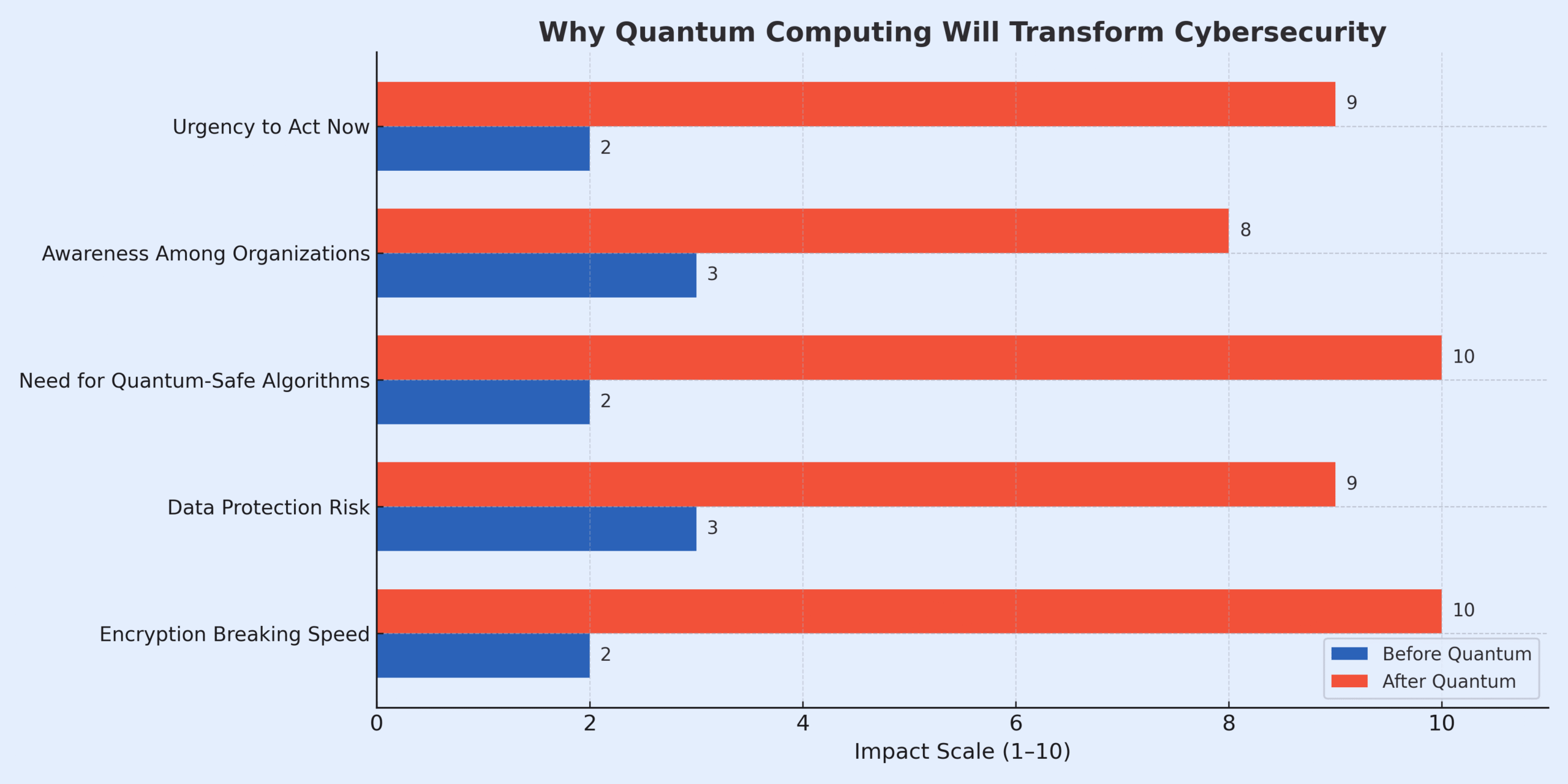We are living in a time of rapid tech breakthroughs — but few are as fascinating and game-changing as quantum computing. It’s not just a flashy term; indeed a real shift in how we solve problems that today’s computers can’t handle. Quantum computers can process information millions of times faster than today’s machines — opening the door to breakthroughs, once considered as science fiction. Quantum computing is ready to revolutionize cybersecurity—more than any other field. The threat is real, and the transformation is already underway.
The Quantum Leap: What makes it different?
Unlike classical computers that use bits (0s or 1s), quantum computers use qubits. These qubits can exist in multiple states simultaneously; a phenomenon called as superposition. Notably, they can process a huge number of possibilities at the same time. Quantum entanglement links qubits instantly—even if they are far apart, thus making communication faster and more powerful. This happens even if they both are on opposite corners of the world. It’s like they are speaking a secret language, faster than the speed of anything we have known. Thus, these principles enable quantum computers to perform complex calculations at a scale where classical systems simply can’t match.
To put it in perspective: a quantum computer with just 300 qubits could perform more calculations in an instant than there are atoms in the observable universe.
Why Cybersecurity is at risk?
Modern cybersecurity relies heavily on encryption methods that would take classical computers thousands of years to break. Take RSA encryption, for example—it protects data by relying on how hard it is to break down large prime numbers. Classical computers struggle with this but quantum computers don’t have any problem. Importantly, the best example is of the Shor’s Algorithm. It is a quantum based algorithm, capable of factoring large numbers exponentially faster than any known classical algorithm. According to researchers at Google and IBM, a sufficiently powerful quantum computer could break a 2048-bit RSA encryption in just seconds. However; this level of quantum power doesn’t exist yet, but the progress is accelerating.
Realistic Timelines and Industry Warnings
Since 2024, tech giants like IBM and Google, along with new firms, such as Rigetti and IonQ, have made major progress in advancing quantum computing. IBM has already announced its plan to release a 4,000-qubit system by 2025. Although, it won’t be capable of breaking RSA encryption immediately, therefore; this signals a rapid march toward quantum supremacy.
Deloitte released a survey in 2024 mentioning that 52% of global organizations are accessing their exposure and working on to develop quantum-related risk strategies. The U.S. National Institute of Standards and Technology (NIST) is already working to standardize post-quantum cryptographic algorithms. However; this mainstream adoption could take years to come.
Real-World Example: Banking on Quantum Threats
Banks rely on secure encryption to protect trillions of dollars in transactions daily. If a malicious intruder gains access to a quantum computer, he could potentially unlock both past and future encrypted financial communications — putting sensitive data at serious risk. The term “Harvest Now, Decrypt Later” is already being used to describe attackers who are storing encrypted data today, anticipating the quantum ability to break it tomorrow. This isn’t just a theory. In 2020, the U.S. Cybersecurity and Infrastructure Security Agency (CISA) issued an advisory, urging organizations to secure their encrypted data now.

Quantum-Resistant Solutions: The Counterattack
Here is the good news! The cybersecurity community is not standing still and proposed some quantum-resistive solutions, including post-quantum cryptography (PQC). The PQC is an emerging field— developing algorithms, resistant to quantum attacks. These algorithms are being designed to run on classical computers but can withstand threats posed by quantum processors. Furthermore, NIST has finalized three post-quantum cryptography standards in August 2024 to protect against the emerging threats initiated by the quantumn computers. These standards are classified as: FIPS 203 (designed for general encryption), FIPS 204 and FIPS 205 (both are intended for digital signatures).
Companies like Microsoft and Google are already testing these quantum-safe algorithms in real-world systems. Moreover, in 2023, Google Chrome posted a hybrid post-quantum encryption protocol to protect the https connections.
What’s at Stake Beyond Finance?
Quantum computing threatens more than just financial institutions. Here are other sectors at risk:
- Healthcare: Patient records and drug formulas can be exposed.
- National Security: State secrets and military communications are prime targets.
- Intellectual Property: Trade secrets and proprietary data could be stolen and exploited.
In short, any industry relying on data confidentiality, integrity, and availability is at huge risk by the quantum computing technology.
The Urgency for Action
Cybersecurity professionals, policymakers, and tech leaders must act now to prepare for a quantum future. However; waiting until quantum computers reach maturity would be like —installing a lock after the burglar has entered.
Steps to Prepare?
- Data Inventory: Identify sensitive data in the inventory that must remain secure for 10+ years.
- Adopt Hybrid Cryptography: Start using systems that combine classical and quantum-safe encryption.
- Stay Informed: Follow NIST updates and the corresponding industry standards.
- Collaborate: Engage with trusted vendors and regulatory bodies to proactively proof your systems in future against the emerging technological risks.
Conclusion: A Wake-Up Call
Quantum computing promises a revolution, but revolutions come with upheaval. For cybersecurity, this means rethinking our defenses from the ground up. The shift won’t happen overnight, but it will happen faster than many expect.
Organizations that take proactive steps today will be the ones leading tomorrow. Because in the post-quantum world, security won’t be optional—it will be everything.




Fantastic article! So glad I found this.